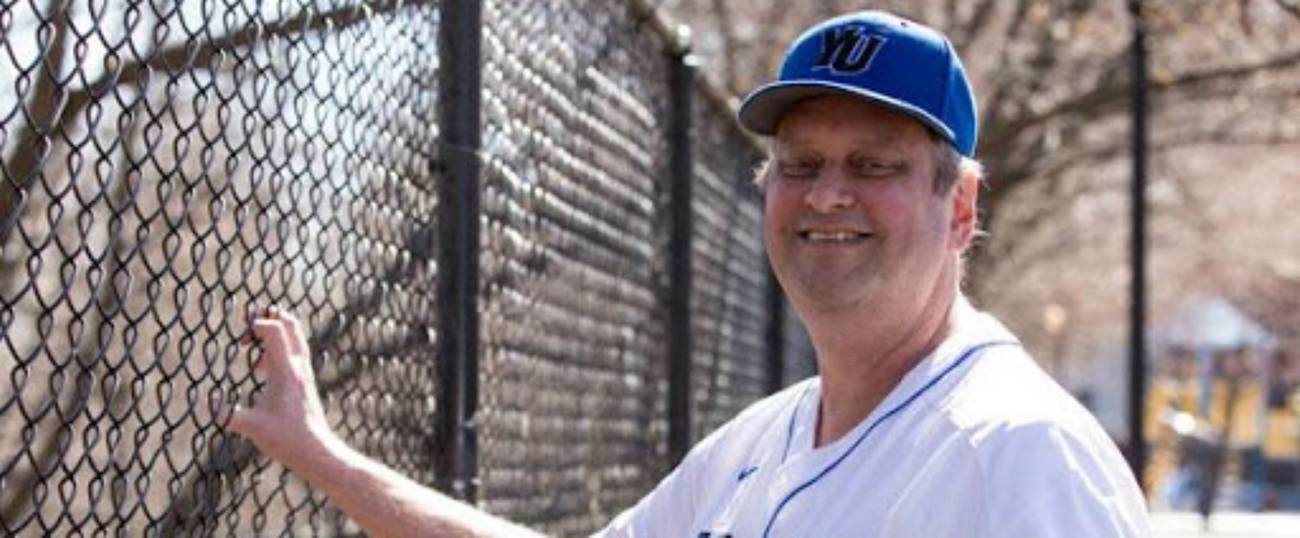The Chosen
Former Yeshiva University professor Bob Tufts officially became a Jew in 1982, the same year he was traded from the San Francisco Giants to the Kansas City Royals. Tufts died last month at 63.




For Bob Tufts, who passed away last month at age 63 after a yearlong battle with multiple myeloma, his life in baseball and as a Jew were forever intertwined. His devotion to both formed deep roots as a Princeton undergrad, where he excelled as a student and starting pitcher. Most important, it was where he met and fell in love with his wife of 34 years, Suzanne Israel.
Both of us Goldbergs knew Bob personally. Robert from his time working on patient advocacy campaigns through the Center for Medicine at the Public Interest and Zach, through his father’s connection, and from spending time together at Yankee games and talking baseball.
Bob signed with the San Francisco Giants after graduating Princeton in 1977 because he thought being paid to play baseball and travel the country, and especially being part of a team and able to make a difference in the game he loved, was an incredible opportunity.
Similarly, Bob chose to join the Jewish people because it is, in a real way, a team organized to pursue meaning. Being Jewish to him meant “being part of people devoted to taking individual words and moving them, shaping them, looking underneath—trying to put sense into a world, trying to put things into a package that people can deal with.”
He officially converted in 1982, coincidentally the same year he was traded from the San Francisco Giants to the Kansas City Royals. When the rabbi asked him what Jewish name he had chosen, he said Sandy Koufax. That suggestion was politely rejected. So, Tufts went with Reuven Ben Avraham after Reuven Malter, the protagonist in Chaim Potok’s book The Chosen, who also combined a love of baseball and Judaism.
As a pitcher, he used his size and a variety of arm angles to hide what he was throwing. Like another KC Royals pitcher, David Cone, Bob regarded pitching as asymmetrical warfare, using what the hitter guessed would be thrown to introduce surprise. And, as he told us more than once, he enjoyed pitching inside and tying up hitters. (He often complained that today’s pitchers don’t do enough.)
His pitching career was cut short by arm problems caused by overwork in the minor leagues. In 1978 15 of his 19 starts were complete games. In a 1982 stint in the minors, he pitched 5 1/3 innings in relief during the first game of a doubleheader and then came in as a reliever for two innings in the second game.
He retired in 1984, after one season with the Giants and two with the Kansas City Royal. In 1983 he was traded to the Reds but was released before the 1984 season started. He didn’t find out until 1999 that he had been pitching all that time with a torn rotator cuff and calcium deposits in his shoulder.
After baseball, he received an MBA from Columbia University. He went into finance and worked on Wall Street for 20 years. In an interview he gave to his hometown newspaper, he described finance as rewarding but intellectually vapid.
His dissatisfaction with Wall Street seemed to be connected to his desire to contribute to baseball and Judaism.
As Jim Bouton wrote in Ball Four, “a ballplayer spends a good piece of his life gripping a baseball, and in the end, it turns out that it was the other way around all the time.”
Bob used every opportunity to stay in and around the game. He was involved in the Baseball Hall of Fame. He quietly campaigned to get the Hall to admit Marvin Miller, the former labor lawyer who helped the MLB Players Association force free agency into being. Bob was also part of the National MLB Player alumni association and eventually become the New York State chapter president.
Not surprisingly, he took it upon himself to celebrate the contribution of Jewish ballplayers to the National Pastime. He spoke at many conferences, including a two-day session on Jews and Baseball at the Hall of Fame.
And so, it was fitting that Bob was one of the first Jewish players to travel to Israel to support the first Israel Baseball League. He was at the Hall of Fame event on Jews and Baseball when Daniel Kurtzer, US Ambassador to Israel under President George W. Bush and, more importantly, commissioner of the inaugural 20006 Israel Baseball League, asked him to travel to Israel and provide instruction to the kids who comprised the first Israeli National Baseball team.
***
Bob stopped working on Wall Street after he was diagnosed with multiple myeloma in 2009.
His desire and demand for meaning led him to teach business at New York University, Manhattanville, and finally Yeshiva University. In 2014, much to his delight, he became a full-time professor at Yeshiva University’s Sy Syms School of Business. He loved YU. It was proudly Jewish, pro-Zionist (unlike NYU), and he got to teach and talk about baseball and sport. In 2018 was both business professor of the year and the pitching coach for the YU baseball team. He was beloved by his students and players.
Teaching at YU produced another benefit—at least for us. We are both devoted Yankee fans, and by virtue of YU’s proximity to Yankee Stadium, we went to a lot of games with Bob.
Gift from my friend @TuftsB to give me comfort until spring training. #Yankees #springtraining pic.twitter.com/n1Xn8kGDNh
— Robert Goldberg (@DrBobGoldberg) November 10, 2017
There was nothing better than talking or texting about baseball with Bob. Except for going to see baseball games with him. It was easy to spot him in the throng because he stood taller than everyone else. And like eager students, we would pepper him with questions about pitch selection and his professional experience inning after inning.
Unfortunately, by the fall of 2018, Bob’s myeloma came roaring back at about the same time Suzanne was diagnosed (and successfully treated for) breast cancer. Bob said nothing about his disease until his wife completed her treatment.
Over this past year, our texting with Bob was less frequent. More often than not, he shared his battle with myeloma and his remaining treatment options rather than baseball stats or health care policy. He complained about being tired and expressed frustration about the disease’s comeback. Looking back on those conversations, we see that we tried to respond in any way that would acknowledge that Bob was telling me he was running out of time and options.
Neither did he. Before he underwent this most recent transplant, he teased, “the last time I got an ASCT was the last time the Yankees won the World Series. (And no, I won’t do this every year!).”
The graft never grabbed hold, and without an immune system, Bob’s organs were consumed by infection. He passed away the Friday before Shabbat Shuva, after watching baseball with the true and enduring loves of his life, his wife, Suzanne, and his daughter Abby.
We finished writing this article after his funeral and accompanied him to the cemetery. Throughout the day we thought of our friend, colleague, and hero and wondered if there was another reason beyond baseball that he chose Reuven Malter as his Hebrew namesake. We’d like to think that we knew and loved Bob well enough to figure out why.
At the end of the novel, Reuven’s father, David, has suffered a second heart attack after exhausting himself working on behalf of the new Jewish state. When Reuven asks him to “take it a little easy,” his father responds:
“We live less than the time it takes to blink an eye, if we measure our lives against eternity…a blink of an eye in itself is nothing. But the eye that blinks, that is something. A span of life is nothing. But the man who lives that span, he is something. He can fill that tiny span with meaning, so its quality is immeasurable though its quantity may be insignificant…A man must fill his life with meaning, meaning is not automatically given to life.”
It is hard work to fill one’s life with meaning. That I do not think you understand yet. A life filled with meaning is worthy of rest. I want to be worthy of rest when I am no longer here…”
Bob Tufts filled his life with meaning by filling the lives of others with hope, purpose, and love. He is worthy of rest. He would want us to remember him by being worthy of ours. Zichrono l’ vracha.
Robert Goldberg, PhD is Vice President, Center for Medicine in the Public Interest. Zach Goldberg is a PhD candidate in Political Science at Georgia State University. You can follow him on Twitter at @ZachG932
Robert Goldberg, PhD is Vice President, Center for Medicine in the Public Interest.Zach Goldberg is a PhD candidate in Political Science at Georgia State University. You can follow him on Twitter at @ZachG932